
A brand new cast makes PCPA Theaterfest’s production of Daddy Long Legs, Paul Gordon and John Caird’s exquisite gem of a musical, seem fresh and new, even for those like this reviewer who fell in love with it in previous engagements at the Rubicon and La Mirada. Though Jean Webster’s 1912 novel Daddy-Long-Legs fits squarely in the Children’s Books section of your local library or Barnes And Noble, its musical adaptation (minus hyphens) once again proves absolutely right for ages eight to eighty.

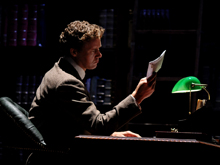
“Daddy Long Legs,” as readers of the novel will know, is the nickname given by 18-year-old orphan Jerusha Abbott to “John Smith,” the anonymous benefactor who has chosen to finance her college education. A trustee at the John Grier Home For Girls where Jerusha has grown up, “Smith” has agreed to pay her tuition as well as a generous monthly allowance on condition that she write him once a month to keep him posted on her progress as a student and would-be novelist. He informs Jerusha, however, that he will never reveal his identity to her nor will he ever reply to her letters.
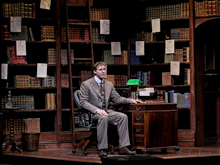
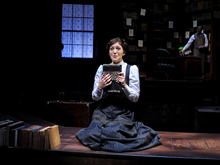
Following its introductory chapter, Webster’s novel is told entirely through Jerusha’s letters to “Mr. Daddy-Long-Legs Smith,” a nickname arrived at from Jerusha’s one glimpse of her benefactor’s elongated shadow. Only in the final letter does the reader learn the identity of the novel’s titular character. For Daddy Long Legs The Musical, Gordon and Caird have chosen to follow Jerusha’s story from both her point of view and that of her patron, and this of course necessitates revealing exactly who “John Smith” is from the get-go. Thus, it is no spoiler to disclose here that Daddy Long Legs is neither old nor gray nor bald, as Jerusha imagines him to be, but instead a tall, handsome young philanthropist named Jervis Pendleton, who happens also to be the wealthy uncle of one of her college classmates. (How very convenient for Jervis when he determines that the time has come to meet the fair Jerusha.)
 Gordon and Caird’s decision to tell their story through the eyes of both characters’ proves to be a wise one. True, the element of surprise is lost, but in its place is the far more tantalizing element of romantic suspense. We very soon realize that Jerusha and Jervis are made for each other, and this knowledge keeps us on the edge of our seats until the moment when, as we all know will happen, Jerusha realizes that the man she has loved on paper and the man she has fallen in love with in real life are one and the same.
Gordon and Caird’s decision to tell their story through the eyes of both characters’ proves to be a wise one. True, the element of surprise is lost, but in its place is the far more tantalizing element of romantic suspense. We very soon realize that Jerusha and Jervis are made for each other, and this knowledge keeps us on the edge of our seats until the moment when, as we all know will happen, Jerusha realizes that the man she has loved on paper and the man she has fallen in love with in real life are one and the same.
Bring your Kleenex, because as many as are the laughs in Caird’s book, your eyes are likely to be wet from start to finish, especially with a score as exquisite as the one Gordon has written, this time brought to life by Broadway’s Kevin Earley and the enchanting Ephie Aardema.
There were a half-dozen years—from 2001’s Carousel at Civic Light Opera South Bay Cities to 2007’s Chess In Concert at the Ford Amphitheatre—that just about every romantic leading man role in just about every major L.A.-area production I saw was filled by Kevin Earley, and rightfully so, his combination of curly-haired boy-next-door good looks and best-there-is voice making him the logical 21st Century heir to the legendary John Raitt and Alfred Drake. The East Coast then called, New York’s lucky gain the West Coast’s unfortunate loss—all the more reason to celebrate Earley’s limited-engagement return and more particularly his commanding work as the stodgy “Daddy” whose heart gets melted by an orphan named Jerusha.
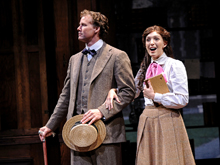
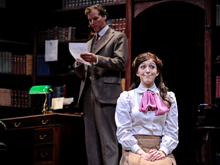
As for Aardema, who first won this reviewer’s heart this past spring in The Old Globe’s World Premiere musical A Room With A View, this youngest-ever graduate of New York’s Circle In The Square School Theatre School could not make for a more endearing Jerusha. With the kind of signature vocals that will make her voice instantly recognizable to musical theater aficionados, an instantly captivating stage presence, and a just-right combination of cuteness, vulnerability, and spunk, Aardema makes the part of Jerusha utterly, indelibly her own.
The songs performed by Earley and Aardema are tuneful without being saccharine and complex without being inaccessible, and feature lyrics that are alternately charming, clever, and touching. Tony-nominee Gordon’s score has also undergone considerable fine-turning over the past three years. Act Two’s “I Have Torn You From My Heart,” excised in the La Mirada production, has wisely been restored for Jerusha’s pivotal Act Two hardening of heart. “What Does She Mean By Love?,” added after the Original Cast Recording, has been moved from its Act One finale position to mid-act, in order to keep the end-of-act focus on both characters, and not just Jervis. Also, Jervis’s Act Two preview of “All This Time” has gotten new lyrics as “The Man I’ll Never Be,” the better to differentiate it from Jerusha’s eleventh hour discovery of Daddy Long Legs secret identity. Gordon’s songs remain some of the best of the past few years, his technique of previewing melodies and then bringing them back like old friends a particularly effective one.
Making Gordon’s score sound all the more gorgeous is musical director Julie McBride, conducting the production’s excellent live six-piece orchestra which features McBride on keyboard, richer and more lush-sounding than you’d ever expect a mere six-instruments to be thanks to Gordon’s and Brad Haak’s orchestrations, with additional arrangements by Laura Bergquist.
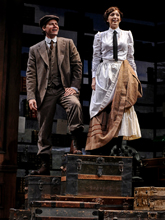

Designer David Farley’s deceptively simple though well-appointed library set does wondrous things as the evening progresses. His costumes for Jerusha are a perfect early 20th Century blend of tweediness and femininity, and Jervis’s duds are deliciously fuddy-duddy as befits the character. Paul Toben once again shows why he’s one of the Big Apple’s brightest young lighting design talents with his exquisite work here. Since most scenes in Daddy Long Legs take place simultaneously in two different locations, Toben has effectively created two different lighting plots for each of these scenes. He’s also conspired with Farley for some design surprises which transport us to unexpected places. Properties designer T. Theresa Scarano completes the production’s Grade A design team. Christina M. Burke is associate director and production manager. Katie M. Dayley is production stage manager.
When a musical moves beyond its original cast and on to new artists, it is a clear sign that,in showbiz parlance, the show “has legs.” With a glowing future ahead of it, PCPA Theaterfest’s production makes amply clear that these will be long legs indeed.
Solvang Festival Theater, 420 2nd Street, Solvang.
www.pcpa.org
–Steven Stanley
August 26, 2012
Photos: Luis Escobar Reflections Photography Studio


 Since 2007, Steven Stanley's StageSceneLA.com has spotlighted the best in Southern California theater via reviews, interviews, and its annual StageSceneLA Scenies.
Since 2007, Steven Stanley's StageSceneLA.com has spotlighted the best in Southern California theater via reviews, interviews, and its annual StageSceneLA Scenies.







 COPYRIGHT 2025 STEVEN STANLEY :: DESIGN BY
COPYRIGHT 2025 STEVEN STANLEY :: DESIGN BY